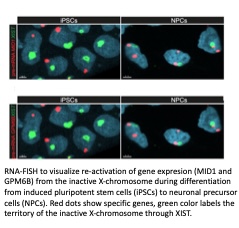Re-Activation of Expression from the Inactive X-Chromosome Influences Health and Disease in Aging Cells
Sex profoundly impacts aging, longevity and health. Differences between males and females have been described for several of the hallmarks of aging, including telomere attrition, loss of proteostasis and mitochondrial function.
The gonosomal complement and in particular the inactive X-chromosome in female cells seems to substantially contribute to sex differences seen in the aging process. Several genes escape X-inactivation in a tissue-dependent manner and with a high grade of individuality thereby leading to sex-biased expression and increase in dosage and diversity of gene expression in females. A significant proportion of such escapees are active in the immune and nervous systems.
In the proposed project we will use our observations made in differentiating neurons and ask if and how re-activation of X-chromosomal gene expression is affecting tissue functionality and decline over time. We will use single cell technology in an allele-specific manner, will study aging models in-vitro and in-vivo and will use state-of-the-art computational modelling to generate an integrated model describing the effects of the gonosomal complement on the hallmarks of aging.
A focus on gender is becoming a critical part of the aging research landscape in Mainz and elsewhere and will substantially contribute to the profile of the Center of Healthy Aging. Moreover, this project closely connects immunology and neuroscience and by bringing into fundamental biology, it promises to not only describe function but understand the underlying mechanisms.

Principle Investigators
· Prof. Dr. Susann Schweiger, Institute for Human Genetics, University Medical Center (person of contact email)
· Prof. Dr Peter Baumann, Department of Biology, JGU
· Prof. Dr. Susanne Gerber, Institute for Human Genetics, University Medical Center
· Dr. Hans Christian Probst, Institute for Immunology, University Medical Center
· Dr. Maria Felicia Basilicata, Institute for Human Genetics, University Medical Center
· Dr. Claudia Isabelle Keller Valsecchi, Institute of Molecular Biology, JGU

